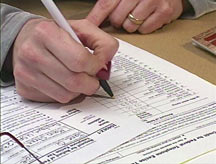Worker tax cut may be slow in coming
Details of the 'Make Work Pay' credit, a major element in the recovery proposal, may slow the process of getting money into workers' pockets.
NEW YORK (CNNMoney.com) -- Congress is racing to pass a giant bill to stimulate the economy. But a key piece of it may be a little slower in coming than many people expect.
The biggest single tax break in the Democrats' proposed economic recovery package is the $145 billion "Make Work Pay Credit."
The credit, which President Obama championed, would reach close to 95% of workers and be paid primarily through paychecks. It would be worth $500 per worker or $1,000 for couples who file jointly. The full credit will be available to those making $75,000 or less, or $150,000 or less for couples. Even workers in those income groups with no tax liability would get it.
The bill is still being debated. But as things currently stand, workers may not see that money until June. And some of the lowest wage workers - those who economists say are most likely to spend the money rather than save it - may not see their credit until they file their 2009 federal tax return sometime next year.
But for the credit to be paid out in workers' paychecks, employers will need to change how much tax they withhold. And they would need new withholding tables from the Treasury Department to do that.
Thomas Barthold, a deputy chief of staff at the Joint Committee on Taxation, told lawmakers on the House Ways and Means Committee on Thursday that he understood Treasury may not be able to get those tables to all employers before June 1.
That means it could take 15 weeks if the bill is enacted by President's Day, as Democrats have promised.
The American Payroll Association paints a slightly more optimistic picture. The trade group, which represents payroll specialists, was told by Senate staffers that Treasury might need only 10 weeks to revise and distribute the withholding tables, said Michael O'Toole, APA's senior director of government relations and publications.
Meanwhile, a Ways and Means staffer told CNNMoney.com Thursday, "We've heard they will do them as quickly as possible."
A Treasury spokesman was not immediately available for comment.
Economists have been urging lawmakers for months to act swiftly to get money distributed to states, businesses and consumers to help stem the economic downturn. And many, like Lakshman Achuthan, managing director of Economic Cycle Research Institute, have stressed that the timing of stimulus is paramount to its success.
"This would have been great a year ago, but now consumers are so defensively oriented that the boost to the economy will be more limited," Achuthan said. "Any substantial delay from today increases the risk that the economy will tumble into a much deeper recession, which will be all the more difficult to climb out of later."
Mark Zandi, founder of Moody's Economy.com whose research has been relied upon by the Democrats to make their case for stimulus, was a little more optimistic. He said June 1 is not too late but that an earlier start would help boost the economy more.
"Every day matters," Zandi said. "The economy will be under severe pressure early this year, and the benefit of the stimulus could be overwhelmed if it doesn't get into the economy quickly."
Even if Treasury is able to turn out new withholding tables on a dime, the way the provision is currently structured, the lowest income workers may not see their 2009 credit until the first quarter of 2010.
"The biggest sticking point is for people who have very little or no income tax withheld because they earn too little or take a lot of exemptions. They'd have to wait for some or all of their credit until they file [their tax return]," O'Toole said.
Of course, the lowest paid are also those most likely to be living paycheck to paycheck and more likely to spend the money quickly.
Even middle-income folks will have to wait to get some of their 2009 credit since the full $500 (or $1,000 for joint filers) likely wouldn't all be paid out this year since it would go into effect after a considerable number of pay periods have passed. Workers could claim the unpaid portion of the 2009 credit on their federal tax return due April 15, 2010, according to the Ways and Means Committee. ![]()



